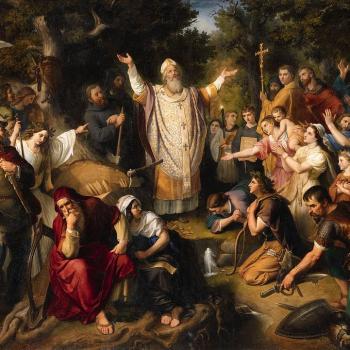"How is it that you have come home so soon today?" They said, "An Egyptian delivered us out of the hand of the shepherds and even drew water for us and watered the flock." He said to his daughters, "Then where is he? Why have you left the man? Call him, that he may eat bread." And Moses was content to dwell with the man, and he gave Moses his daughter Zipporah. She gave birth to a son, and he called his name Gershom, for he said, "I have been a sojourner in a foreign land" (Exodus 2:18-22).
While the details are limited, it is apparent that Moses, after being invited to Jethro's home (tent?) for a meal, made an arrangement in which Zipporah, the priest's eldest daughter, was married to Moses who then took on responsibilities caring for Jethro's flocks (see Exodus 3:1). Moses was thus able to call himself a sojourner (ger), not a foreigner (nekhar), even though he lived in a foreign (nakhiriyah) land. Gershom, his son's name, contains the word ger, reflecting the residential status of Moses.
From the foregoing texts we can conclude that in the ancient biblical world, countries had borders that were protected and respected, and that foreigners who wanted to reside in another country had to obtain some sort of an invitation or permission in order to be considered an alien with certain rights and privileges. The delineation between the "alien" or "stranger" (ger) and the foreigner (nekhar or zar) in biblical law are stark indeed. The ger in Israelite society, for instance, could receive social benefits such the right to glean in the fields (Leviticus 19:9-10; Deuteronomy 24:19-22) and they could receive resources from the tithes (Deuteronomy 26:12-13). In legal matters, "there shall be one statute for you and for the stranger who sojourns with you, a statute forever throughout your generations. You and the sojourner shall be alike before the LORD. One law and one rule shall be for you and for the stranger who sojourns with you" (Numbers 15:15-16). In the area of employment, the ger and citizen were to be paid alike (Deuteronomy 24:14-15). In all these cases, no such benefit is extended to the nekhar or zar.
In a sense, the ger was not just an alien to whom social and legal protections were offered, they were also considered converts, and thus could participate in the religious life of the community, e.g. celebrate Passover (Exodus 12:13) and observe Yom Kippur, the day of atonement (Leviticus 16:29-30). They were, however, expected to keep dietary and holiness laws (Leviticus 17:8-9, 10-12). Within Israelite society, money was not to be lent with interest, but one could loan at interest to a foreigner (nekhar) (Deuteronomy 23:20). These passages from the Law make plain that aliens or strangers received all the benefits and protection of a citizen, whereas the foreigner (nekhar) did not. The reason for this clear difference is that the ger had legal status in this land; they were documented! It is wrong, therefore, to confuse these two categories of foreigners and then to use scriptural passages regarding the ger as if they applied to illegal immigrants of today. I would argue that if one wants to apply biblical passages regarding the ger to our context, green card holders would correspond approriately.
Finally, a brief word on the biblical practice of sanctuary. This had its origin in the wilderness period in Sinai after the exodus from Egypt. There, the entire community lived with the Tabernacle, Israel's sanctuary, in the middle of the camp. Exodus 21:12-14 establishes the practice: "Anyone who strikes a person with a fatal blow is to be put to death. However, if it is not done intentionally… they are to flee to a place I will designate. But if anyone schemes and kills someone deliberately, that person is to be taken from my altar (in the sanctuary) and put to death." Cases of involuntary manslaughter or negligent homicide (Exodus 21:33-36) were not capital offenses. So to keep the lex talionis (law of retribution), "eye for eye, tooth for tooth … life for life" (Exodus 21:23-25) from being carried out by family members, the offender was to run to the sanctuary where he would be safe and his case heard. Once the populace spread throughout their new homeland, it was impractical to have just one place of sanctuary. Consequently, six cities of refuge were designated, three on either side of the Jordan River (Numbers 35:11-30; Joshua 20:1-6). Once again the conditions for sanctuary protection are plainly stated, "these six towns will be a place of refuge … so that anyone who has killed another accidentally can flee there" (Numbers 35:15, NIV). Sanctuary, then, is explicitly a place to get a fair hearing in the case of accidental death, but for no other crime. The cities of refuge were not a place to avoid trial or punishment. American cities that use their communities to circumvent the law to help the illegal alien in the name of justice are doing a gross injustice to the letter and spirit of the biblical law.
The intention of my above-mentioned book and this paper is not to discourage Americans from consulting the Bible or even using it to shape public policy and law, but to call attention to current the abuse of scripture and to urge that it first be read carefully and contextually, before emotionally satisfying, but simplistic and inaccurate interpretations are applied to illegal immigrants in 21st-century America.
*All translations are form the English Standard Version unless otherwise specified.




